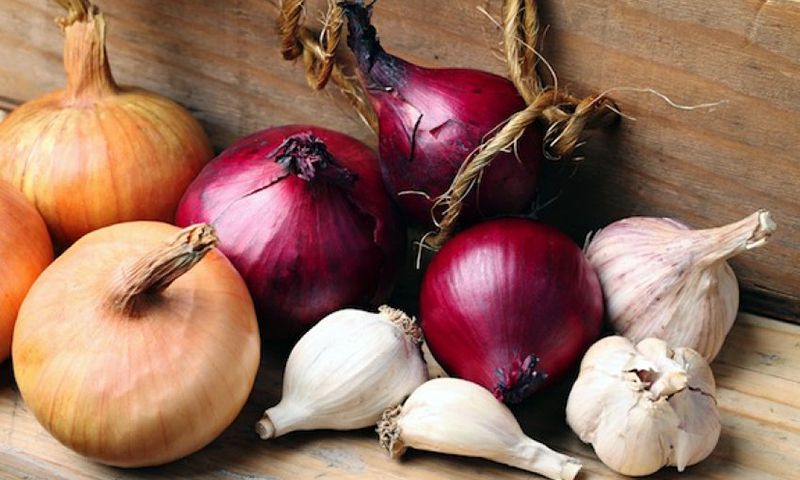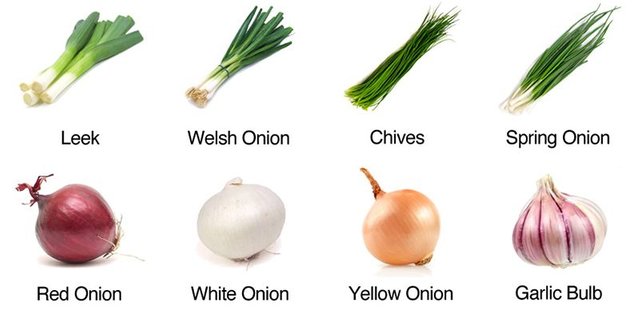Garlic & Onions Do More Harm than Good?

For the past four or five years I've been a pretty heavy eater of garlic and onions. I'd heard from multiple sources how healthy these two items were. And yay, they are relatively inexpensive and add flavor to a wide variety of dishes! I would typically slow cook them in a pan with water and coconut oil or grapeseed oil and when they get soft, add other items. These two "vegetables" were the foundation for many or even most of the savory meals I make.
Yesterday a friend posted some disturbing information about onions and garlic. So I've been researching and wow! There is a huge amount of evidence out there that garlic and onions, except in very specific and limited situations, are both quite toxic to the body and mind. It was hard to hear.
So I did some research.

[for the rest of this article, I'm pulling heavily from other articles, including http://www.raw-food-health.net/Onion-Toxicity.html]
Onions, shallots, leeks, chives, scallions, and garlic are part of the Allium family. Allium is a genus of perennially-growing bulbous plants that produce the following chemical compounds: cysteine sulfoxide, isoalliin, syn-Propanethial S-oxide, allicin, and mustard oil, which are responsible for their distinctive taste, smell, and the irritation they cause to your body. I'm researching all these compounds. For now, let's talk about Allicin.
Allicin is a sulfur compound found in onions responsible for a lot of the irritation the plant causes. Why is Allicin there?
According to chemist Eric Block of the University of Missouri at St. Louis, who has been studying onions since 1971:
"Since allicin is antifungal as well as antibiotic, it could offer the garlic plant protection against the bulb decay induced by fungi. And since the lacrimatory factor is irritating and repugnant to certain animals, it too has survival value."
-Eric Block, Ph.D., "The Chemistry of Garlic and Onions."
Essentially what we have is an element - just one of several sulfur compounds present - that is intended to repel and injure things that would devour the plant and bulb, be they fungi, bugs, of mammals. When onion extract is applied to bacteria and fungi it literally destroys them.
Now begins my experiment to see if my health changes when I suddenly remove these two items from my diet.
Following are some quotes that impacted me from other articles on the topic:
"But What About All Those Benefits?
The cures attributed to onions are essentially drug reactions and the resulting stimulation of your body attempting to rid itself of harmful substances. Treating yourself with an onion is like taking a drug in the hopes that your body will stop producing that symptom. And just like drugs, when you rely on such a treatment you never remove the underlying cause and merely hope any side effects brought about by the drug reaction will be bearable.
If the entire Allium family were a drug, there would have to be a warning attached to the commercials, undoubtedly spoken by an agreeable-sounding women reading the list as if she were chatting about the pleasant weather:
The Allium Family Warning Label
Onions and other members of the Allium family may cause bad breath, indigestion and acid reflux (15), anemia, reduced blood clotting, or even death. Pregnant women should avoid the Alliuin family because its members have been known to cause accidental abortions in humans (13). Nursing women should not eat them because the chemical Allicin enters into their breast milk and disturbs a baby's ability to breast feed (13).
Those at risk for major bleeding, such as those soon to undergo surgery or enter into labor are urged not to eat members of the Allium family because they have been shown to prevent the clotting of open wounds (14)..."
~ http://www.raw-food-health.net/Onion-Toxicity.html
"...Bottom line: If you're wondering if something is health-enhancing, put it to the test... the Nature test: Can you make a meal of it, as it appears in Nature, with no processing or cooking, and is it delicious (assuming your taste buds are functioning properly)? If the answer is 'no', the item must be looked at with suspicion regardless of how much "positive" information there is for it. Just because the vast majority of people "know" that dairy products are good for us, doesn't mean that this is so; in fact, and in reality, it isn't so..."
~ http://health101.org/art_garlic
"...Garlic is toxic to brain cells; garlic's sulphone hydroxyl ion penetrates the blood brain barrier. This was discovered by accident by someone who was calibrating EEG biofeedback equipment. When some of the subjects came back from lunch, they looked clinically "in bad shape" on the electroencephalograph (a device that measures brain waves), which was used in the calibration process. This was traced to the garlic that was heavily consumed at an Italian restaurant that these particular folks had gone to. The same food without the garlic had no such effect... We were building biofeedback equipment and noticed that garlic seemed to desynchronize brain waves. So I funded a study at Stanford and, sure enough, they found that it does have this effect; the sulphone hydroxyl ion penetrates all the brain barriers including the corpus callosum. If you have any patients who have low-grade headaches or attention deficit [disorder], if they can't quite focus on the computer in the afternoon..."
~ http://health101.org/art_garlic
"The Taoists realized thousands of years ago that plants of the alliaceous family were detrimental to humans. They labeled this group of plants – onions, garlic, leeks, chives, and spring onions – the 'five spicy-scented plants.' They noticed that onions are especially harmful to the lungs, garlic to the heart, leeks to the spleen, chives to the liver, and spring onions to the kidneys. Hindus also avoid this group, which they have called the 'five pungent plants.' As well as producing offensive breath and body odor, these plants can induce varying levels of aggravation, agitation, anxiety, and aggression. Thus these irritating substances are harmful physically, emotionally, mentally, and spiritually."
~ http://health101.org/art_garlic
Sources:
- Simoons, Frederick (1998). Plants of life, plants of death. Univ of Wisconsin Press. p. 568. ISBN 0299159043. Retrieved 2009-07-13.
- "About Onions: History". The National Onion Association. Retrieved 2011-3-29. http://www.onions-usa.org/about/history.php
- Eric Block, "Garlic and Other Alliums: The Lore and the Science" (Cambridge: Royal Society of Chemistry, 2010)
- Borelli V, et al. "Fatal onion (Allium cepa) toxicosis in water buffalo (Bubalus bubalis)." J Vet Diagn Invest. 2009 May;21(3):402-
- Crespo R, et al. "Effect of feeding green onions (Allium ascalonicum) to White Chinese geese (Threskiornis spinicollis)." J Vet Diagn Invest. 2004 Jul;16(4):321-5.
- Rae, Ha. "Onion toxicosis in a herd of beef cows." Can Vet J. 1999 Jan;40(1):55-7.
- Knight, AP. Et al. "Adaptation of pregnant ewes to an exclusive onion diet." Vet Hum Toxicol. 2000 Feb;42(1):1-4.
- Kaplan, AJ. "Onion powder in baby food may induce anemia in cats." J Am Vet Med Assoc. 1995 Dec 1;207(11):1405.
- Pierce, KR. Et al. "Acute hemolytic anemia caused by wild onion poisoning in horses." J Am Vet Med Assoc. 1972 Feb 1;160(3):323-7.
- Harvey, JW. Et al. "Experimental onion-induced hemolytic anemia in dogs." Vet Pathol. 1985 Jul;22(4):387-92.
- Block, Eric. "The Chemistry of Garlic and Onions." Scientific American, v252 n3 p114-19 Mar 1985
- Ornish D, Brown SE, Scherwitz LW, Billings JH, Armstrong WT, Ports TA, McLanahan SM, Kirkeeide RL, Brand RJ, Gould KLCan lifestyle changes reverse coronary heart disease? The Lifestyle Heart Trial. Lancet. 1990 Jul 21;336(8708):129-33.
- Barnes J, Anderson LA, Phillipson JD. Herbal Medicines. 2nd edition. London: Pharmaceutical Press; 2002.
- Ang-Lee MK, Moss J, Yuan C. Herbal Medicines and perioperative care. JAMA 2001; 286:208-216
- Allen ML The effect of raw onions on acid reflux and reflux symptoms.
These are also staples in my cooking. You have definitely give me slight cause for concern.
@originalworks
The @OriginalWorks bot has determined this post by @scottermonkey to be original material and upvoted it!
To call @OriginalWorks, simply reply to any post with @originalworks or !originalworks in your message!
To nominate this post for the daily contest, upvote this comment!
For more information, Click Here!
Sadly most people don't know about this. The worst is clearly garlic. Garlic give me fever and I can't fall asleep for hours after I hate some. I avoid garlic as much as possible.
This is some interesting research! I haven't been able to eat French onion soup for many years because of what it does to my stomach, and I usually order my fast food burger without onion. I also dislike the taste of garlic in more than small amounts.
I've also heard plenty of claims from both sides about the health benefits and harms the may do.
With this particular case you're totally right to do an experiment and just see what happens!
If in doubt, cut it out!
Starting to wish I had not read this.. but please let us know how it goes?
Thank you for your research. I'd take all of this with a grain of sodium chloride, however. With exception to the Taoist and Hindu observations, this is the reductionist approach that our current dysfunctional medical model is based upon. Without getting into a long-winded discussion at this late date, backed by research links, I'd like to point out that the consumption of alcohol can damage the liver. But small amount of alcohol create a phenomenon called enzyme induction that forces the liver to produce enzymes that detoxify the blood. Small amounts of alcohol are like making your liver do pushups. While massive amounts of alcohol will give your liver cirrhosis, small amounts make it stronger and increase your level of health.
We don't eat many plants that have strong flavors, especially herbs, because they are bitter. Bitterness is an indication that the plant has self-protective mechanisms built into it. Isolating out these compounds and then administering them to rodents in large dosages often produces negative results. That has little bearing on the reality of their edibility in small quantities. Alliums are used mostly as flavoring agents. Few people sit down and make an entire meal of them like they would wheat or potatoes (which also have isolates that are unhealthy). It's well proven that sulphur compounds fight cancer and that the absence of these might contribute to the cause of some cancers.
We could analyze physical activity and prove that it causes muscle damage. It does. That's how weightlifters become muscle-bound behemoths. The muscles break down due to the exertion and then accommodate the the imposed strains by rising to the occasion: repairing and growing stronger. If we took the muscle damage paradigm and applied it to behavior we would conclude that lying completely still in total physical inactivity would be the best mode for our health. That's not true and we all know it.
I think alliums slightly tax our metabolism and make it stronger and that's why, in a holistic model, they appear to be healthful.
I appreciate your inquisitive attitude and thorough analysis. Following you now.